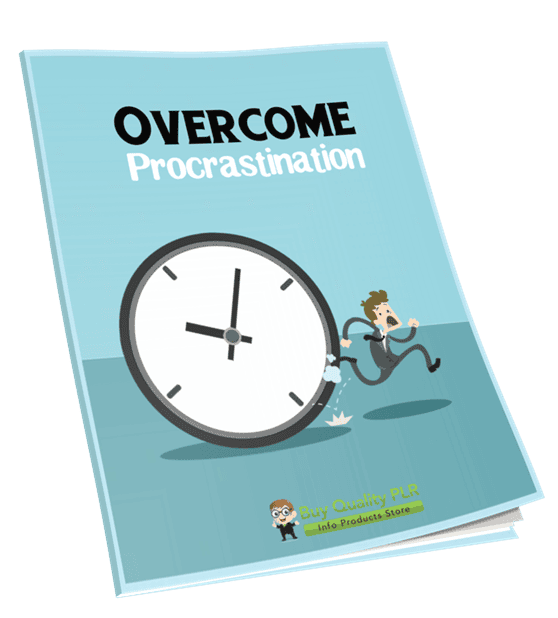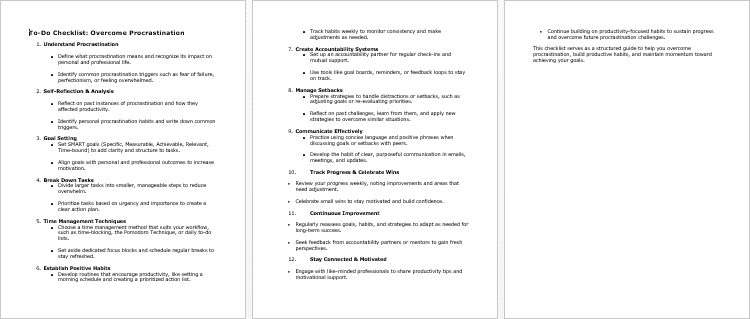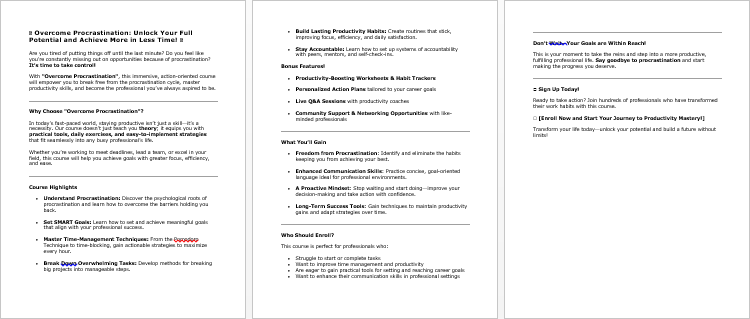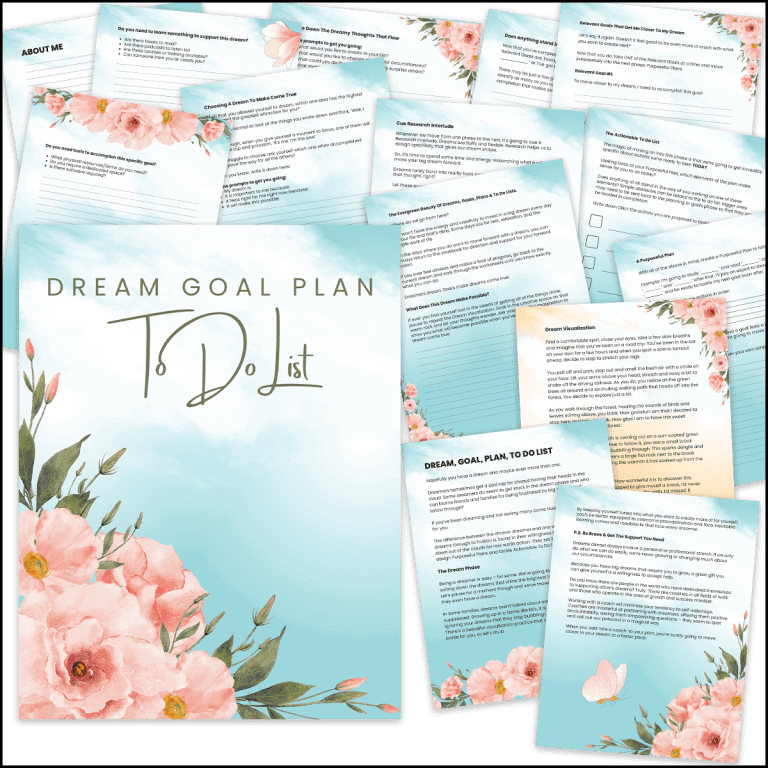
Overcome Procrastination PLR Course 24k Words
in PLR Checklists , PLR eBooks , PLR eCourses , PLR List Building Reports , PLR List Building Reports , Premium PLR , Premium PLR eBooks , Premium PLR Reports , Premium White Label Brandable PLR Coaching Courses , Private Label Rights Products , Self Discipline PLR , Self Doubt PLR , Self Esteem PLR , Self Help PLR , Self Help PLR eBooks , Self Improvement PLR , Self Improvement PLR EbooksChoose Your Desired Option(s)
has been added to your cart!
have been added to your cart!
#procrastinationhelp #timemanagementtips #productivityhacks #overcomeprocrastination #selfimprovementcourse #personalgrowth #motivationmatters #stopprocrastinating
Master the Art of Productivity with Our Overcome Procrastination PLR Course
Break the Cycle of Delay, Boost Productivity, and Stay Ahead
Are you or your audience tired of battling procrastination? Whether it’s putting off important tasks, struggling with prioritization, or losing momentum on key projects, the Overcome Procrastination PLR Course offers a step-by-step guide to overcoming procrastination and building lasting productivity habits.
With 22,753 words of professionally crafted content, this course is ready to rebrand and monetize, helping you deliver life-changing value to your audience.
Presenting…
Overcome Procrastination PLR Course 24k Words
What’s Included in the Overcome Procrastination PLR Course?
Module 1: Understanding Procrastination
- What is Procrastination? Recognize the behaviors and thought patterns that lead to procrastination.
- Procrastination Triggers: Identify and manage personal and universal procrastination triggers.
- The Science of Procrastination: Understand how the brain works and the role of motivation.
Module 2: Strategies to Overcome Procrastination
- Goal Setting and Prioritization: Learn how to set SMART goals and align tasks with outcomes.
- Breaking Down Large Tasks: Make overwhelming projects manageable.
- Time Management Techniques: Master proven strategies like the Pomodoro Technique and time-blocking.
Module 3: Building Positive Habits and Accountability
- Pro-Productivity Habits: Develop routines that encourage focus and consistency.
- Accountability Systems: Create partnerships and feedback loops to maintain progress.
- Overcoming Setbacks: Turn failures into opportunities for growth.
Module 4: Communication Skills for Productivity
- Clear Communication: Learn to convey goals and priorities effectively.
- Presenting Progress in Meetings: Showcase achievements and strategies confidently.
- Networking with Purpose: Build connections while discussing productivity-focused habits.
Module 5: Putting It All Together
- Anti-Procrastination Action Plan: Create a tailored, sustainable plan for staying on track.
- Maintaining Progress: Long-term strategies to ensure productivity gains last.
- Final Project: Summarize and present your journey toward overcoming procrastination.
Why Choose This PLR Course?
Ready-to-Use and Customizable Content
Save hours of time and effort. This PLR course comes fully written and formatted, allowing you to quickly rebrand, customize, and launch your own product.
High-Demand Topic
Procrastination affects everyone—from students to professionals. This evergreen topic ensures strong demand and consistent sales.
Valuable Add-Ons
In addition to the main course, you’ll also receive:
- Checklist: A simple, actionable guide to overcoming procrastination.
- FAQs: Address common questions and concerns about procrastination and productivity.
- Sales Page Copy: Pre-written text designed to help you market and sell the course effectively.
Who Can Benefit from This Course?
- Entrepreneurs and Coaches: Use it to empower your clients or audience with actionable tools to overcome procrastination.
- Content Creators: Turn the modules into blog posts, eBooks, or social media content.
- Corporate Trainers: Offer it as part of a workplace productivity training program.
- Self-Improvement Brands: Add it to your catalog of personal development resources.
How You Can Use and Profit from This Course
- Sell as a Standalone Online Course: Market it as a premium course for $47, $97, or more.
- Break It into Mini-Courses: Turn each module into a standalone offering or webinar.
- Create Lead Magnets: Use the checklist or an excerpt to grow your email list.
- Bundle with Other Products: Combine with related courses or eBooks for a high-value package.
- Membership Site Content: Add it to a self-improvement membership site for recurring income.
Your Investment
For only $14.99, you’ll gain full access to this comprehensive, ready-to-use PLR course, including a wealth of resources to help your audience break free from procrastination and maximize their potential.
Why Buy Quality PLR?
- Professionally Crafted Content: All materials are created to ensure quality and relevance.
- Flexible Usage Rights: Customize, brand, and monetize the content to suit your needs.
- Instant Access: Start reaping the benefits of this in-demand content today.
Transform Lives and Boost Your Business
With the Overcome Procrastination PLR Course, you’re not just offering a product—you’re providing a solution. Help your audience take charge of their time, achieve their goals, and unlock their full potential.
Grab Your PLR License Now for Just $14.99!
Take the first step toward turning procrastination into productivity—start selling or using this course today!
has been added to your cart!
have been added to your cart!
Here A Sample of Overcome Procrastination PLR Course
Course Overview: This course is designed for professionals who want to understand, address, and overcome procrastination in both their personal and professional lives. By the end, participants will have actionable strategies to stay productive and accountable while enhancing their communication skills for international business settings.
Module 1: Understanding Procrastination
Objective: Define procrastination, identify personal and universal triggers, and understand how it affects your work and productivity.
Lesson 1.1: What is Procrastination?
Topics: Defining procrastination, recognizing the signs, and understanding why we procrastinate.
Defining Procrastination
Procrastination is the act of delaying or postponing tasks or decisions, often opting for less urgent, more enjoyable activities instead. Instead of tackling tasks directly, we put them off, sometimes repeatedly, even when we know it may lead to negative consequences. At its core, procrastination often results from factors like fear of failure, feeling overwhelmed, perfectionism, or simply a lack of motivation.
In the professional world, procrastination can impact productivity, team dynamics, and the ability to meet goals and deadlines. This habit can create a ripple effect, leading to stress, missed opportunities, and a sense of regret or guilt for not working efficiently.
While procrastination is often seen negatively, understanding its root causes is key. By identifying why we put off certain tasks, we can start to develop strategies to overcome it, prioritize our goals, and enhance our productivity and overall well-being.
Recognizing the Signs of Procrastination
Procrastination can often creep into our work routines subtly. Recognizing the signs early can help us address them before they disrupt productivity. Here are some common indicators:
- Constantly Delaying Tasks: You keep putting off a task, telling yourself, “I’ll do it tomorrow” or “I work better under pressure.” This delay might be harmless at first but often escalates as deadlines approach.
- Prioritizing Minor Tasks Over Major Ones: If you find yourself completing easy, less important tasks—like organizing files or replying to minor emails—instead of focusing on larger, high-priority projects, it’s a sign of procrastination.
- Waiting for the “Right” Moment: You might be waiting to feel inspired or for circumstances to be “perfect” before starting a task, when, realistically, the right moment rarely arrives.
- Getting Easily Distracted: Instead of diving into work, you might find yourself scrolling through social media, checking emails, or chatting with colleagues. These distractions are a way of avoiding the actual work at hand.
- Feeling Overwhelmed or Perfectionistic: If a task feels daunting or if you believe it needs to be done flawlessly, you might avoid starting it altogether. This mindset often leads to further delays, as the fear of not meeting high standards keeps you from making any progress.
- Last-Minute Scrambling: A common sign of procrastination is frequently working on tasks at the last minute, leading to stress and compromised quality of work.
- Feeling Guilty or Regretful About Delays: If you regularly feel guilty about not starting or finishing tasks on time, it’s likely due to procrastination. This emotional response is a signal that you recognize the delay but are still struggling to overcome it.
Being mindful of these signs allows us to pinpoint where we’re procrastinating and take steps to address it—whether through time management, breaking down tasks, or other productivity strategies. Recognizing these patterns is the first step toward building habits that keep us on track and focused.
Understanding Why We Procrastinate
Procrastination isn’t just about laziness or poor time management; it often stems from deeper psychological triggers and emotional responses. When we understand the root causes, we can work to address and overcome them effectively. Here are some common reasons why we procrastinate:
- Fear of Failure: One of the biggest drivers of procrastination is the fear of failing at a task. When the stakes feel high, we may avoid the task entirely to prevent facing potential disappointment or criticism.
- Perfectionism: Perfectionists often put off tasks because they feel the need to complete them flawlessly. This can lead to a “paralysis by analysis” effect, where they avoid starting because they believe the conditions aren’t ideal for producing a perfect result.
- Feeling Overwhelmed: Large or complex tasks can feel daunting, especially when we’re unsure where to begin. When a project feels too big to tackle, it’s easier to delay it than to take on what feels like an overwhelming challenge.
- Lack of Motivation or Interest: When we find a task uninteresting or not personally rewarding, we tend to push it off in favor of things that bring us more satisfaction. This is especially common in tasks that don’t feel meaningful or immediately rewarding.
- Low Self-Efficacy: Self-efficacy is the belief in our own ability to complete tasks successfully. When we doubt our capabilities, we’re more likely to procrastinate. If we don’t feel confident in our skills or knowledge, procrastination serves as a defense mechanism against potential failure.
- Desire for Instant Gratification: Procrastination can also result from choosing immediate pleasures over long-term rewards. This is why we might opt for activities like browsing social media or watching videos instead of focusing on a project that requires sustained attention and patience.
- Decision Paralysis: When faced with multiple options or decisions, we can become “stuck” due to uncertainty about making the right choice. This decision paralysis can lead to postponing action until we feel confident in our direction, which sometimes never arrives.
- Poor Time Management: Sometimes, procrastination is simply the result of not effectively managing our time. If we don’t allocate specific periods to focus on tasks or underestimate the time needed to complete them, delays are inevitable.
Recognizing these underlying causes is key to developing tailored strategies to combat procrastination. Once we know why we’re avoiding certain tasks, we can start implementing habits and tools to boost productivity and make our work more manageable and enjoyable.
Activity: Reflective Journaling on Procrastination Habits
Objective: This activity will help you identify personal procrastination habits, understand their impact on your career, and develop awareness of triggers that lead to delay. Through reflection, you’ll gain insights into how procrastination has influenced your productivity, professional growth, and job satisfaction, empowering you to take actionable steps to reduce it.
Instructions: Set aside 10-15 minutes for this journaling exercise. Find a quiet place where you can reflect without distractions. Be open and honest in your responses.
Step 1: Identifying Patterns of Procrastination
Reflect on the past few weeks or months and write down your responses to the following questions:
- What types of tasks do you tend to put off the most? (e.g., reports, presentations, emails, team meetings)
- When are you most likely to procrastinate? (e.g., at the start or end of the day, after a big meeting, when faced with a tight deadline)
- What are the common reasons or excuses you give yourself for delaying tasks? (e.g., “I’ll have more energy tomorrow,” “I need more information,” “It’s not that important right now”)
Step 2: Recognizing Triggers and Emotions
Explore the emotional triggers that may prompt your procrastination by answering:
- Do certain emotions, such as stress, boredom, or self-doubt, drive your procrastination?
- Are there particular tasks that make you feel anxious or overwhelmed?
- How do you typically feel after procrastinating on important work? (e.g., frustrated, guilty, relieved)
Step 3: Examining Career Impact
Consider the effects procrastination has had on your professional life. Write about how it has influenced:
- Your productivity and ability to meet deadlines
- Your relationships with colleagues and managers
- Opportunities for advancement or career growth
- Your sense of accomplishment or job satisfaction
Step 4: Setting an Intention
Based on your reflections, set one small, actionable intention to reduce procrastination this week. Examples might include:
- Prioritizing one task each morning that you would typically avoid
- Breaking down a large project into manageable steps and scheduling time for each
- Setting a timer to work on a task for just 10 minutes to get started
Closing Reflection: Once you’ve completed this activity, take a moment to consider any insights you’ve gained. Awareness is a powerful first step in changing habits, so acknowledge any new understanding of your procrastination patterns and commit to practicing one strategy to help overcome it.
Repeat this activity regularly to track your progress and continue building strategies to stay motivated and focused.
Business Vocabulary: Terms like self-discipline, time management, distraction, and efficiency.
Here’s a breakdown of key business vocabulary terms, especially useful when discussing productivity, managing procrastination, and staying focused at work:
- Self-Discipline
- Definition: The ability to control one’s emotions, behaviors, and desires to achieve a particular goal, even when it’s challenging or requires self-sacrifice.
- Example: “Developing self-discipline allows you to stay focused on long-term goals, resist distractions, and push through difficult tasks.”
- In Practice: Self-discipline is crucial for professionals who need to maintain consistent performance, meet deadlines, and stay motivated even when tasks are tough.
- Definition: The ability to control one’s emotions, behaviors, and desires to achieve a particular goal, even when it’s challenging or requires self-sacrifice.
- Time Management
- Definition: The process of organizing and planning how to divide your time between specific activities to work efficiently and productively.
- Example: “Effective time management helps avoid last-minute rushes and ensures all tasks are completed on schedule.”
- In Practice: Mastering time management includes setting priorities, using tools like calendars and to-do lists, and allocating specific time blocks to tackle important tasks without interruptions.
- Definition: The process of organizing and planning how to divide your time between specific activities to work efficiently and productively.
- Distraction
- Definition: Anything that pulls attention away from the task at hand, which can lead to reduced productivity and focus.
- Example: “Identifying and minimizing distractions, like phone notifications, is key to maintaining a productive work environment.”
- In Practice: Recognizing sources of distraction and creating strategies to avoid them—such as turning off notifications, finding a quiet workspace, or using focus apps—can significantly improve efficiency.
- Definition: Anything that pulls attention away from the task at hand, which can lead to reduced productivity and focus.
- Efficiency
- Definition: The ability to accomplish a task or goal with minimal waste of time, effort, or resources, achieving the desired outcome without unnecessary steps.
- Example: “Incorporating efficiency into your work routine leads to higher productivity and better use of resources.”
- In Practice: Professionals aim for efficiency by streamlining processes, cutting unnecessary steps, and using tools or techniques that speed up task completion without compromising quality.
- Accountability
- Definition: Taking responsibility for one’s actions and being answerable for achieving tasks or meeting commitments.
- Example: “Accountability partners can help keep each other on track, especially when tackling challenging or long-term projects.”
- In Practice: Accountability can be fostered in the workplace through regular check-ins, goal setting, and tracking progress to stay motivated and committed to objectives.
- Definition: Taking responsibility for one’s actions and being answerable for achieving tasks or meeting commitments.
- Prioritization
- Definition: The act of ranking tasks in order of importance to focus on what’s most critical first.
- Example: “Effective prioritization prevents important tasks from being overshadowed by less critical activities.”
- In Practice: Prioritization skills involve assessing deadlines, impact, and importance of tasks, often using tools like the Eisenhower Matrix or ABC analysis to decide what needs immediate attention.
- Definition: The act of ranking tasks in order of importance to focus on what’s most critical first.
- Productivity
- Definition: The rate at which work is completed or goals are achieved, often measured by output over time.
- Example: “Increasing productivity isn’t just about working harder but also about working smarter.”
- In Practice: Boosting productivity can include breaking tasks into smaller steps, reducing downtime, and maintaining a focused work environment.
- Definition: The rate at which work is completed or goals are achieved, often measured by output over time.
- Goal Setting
- Definition: The process of identifying specific, measurable, and time-bound objectives to guide actions and efforts.
- Example: “Goal setting provides a clear roadmap and benchmarks to measure progress.”
- In Practice: SMART (Specific, Measurable, Achievable, Relevant, Time-Bound) goals help ensure that objectives are well-defined and attainable, improving motivation and performance.
- Definition: The process of identifying specific, measurable, and time-bound objectives to guide actions and efforts.
- Deadlines
- Definition: Specific dates or times by which tasks or projects must be completed.
- Example: “Meeting deadlines consistently builds a reputation for reliability and dedication.”
- In Practice: Effective time management and breaking tasks into milestones are essential to meet deadlines without last-minute stress.
- Definition: Specific dates or times by which tasks or projects must be completed.
- Focus
- Definition: Concentrated effort on a particular task or goal, avoiding distractions or other tasks.
- Example: “Improving focus can increase the quality and speed of work output.”
- In Practice: Professionals can enhance focus by creating a dedicated workspace, setting specific goals for work sessions, and using techniques like the Pomodoro method.
Mastering these terms and their applications in day-to-day work can help you communicate more effectively in business settings and improve your own productivity practices.
We’re also giving these extra bonuses
Overcome Procrastination – Checklist

Overcome Procrastination – FAQs

Overcome Procrastination – Salespage Content

Package Details:
Word Count: 22 753 Words
Number of Pages: 118
Overcome Procrastination – Bonus Content
Checklist
Word Count: 389 words
FAQs
Word Count: 783 words
Salespage Content
Word Count: 446 words
Total Word Count: 24 371 Words
Your PLR License Terms
PERMISSIONS: What Can You Do With These Materials?
Sell the content basically as it is (with some minor tweaks to make it “yours”).
If you are going to claim copyright to anything created with this content, then you must substantially change at 75% of the content to distinguish yourself from other licensees.
Break up the content into small portions to sell as individual reports for $10-$20 each.
Bundle the content with other existing content to create larger products for $47-$97 each.
Setup your own membership site with the content and generate monthly residual payments!
Take the content and convert it into a multiple-week “eclass” that you charge $297-$497 to access!
Use the content to create a “physical” product that you sell for premium prices!
Convert it to audios, videos, membership site content and more.
Excerpt and / or edit portions of the content to give away for free as blog posts, reports, etc. to use as lead magnets, incentives and more!
Create your own original product from it, set it up at a site and “flip” the site for megabucks!
RESTRICTIONS: What Can’t You Do With These Materials?
To protect the value of these products, you may not pass on the rights to your customers. This means that your customers may not have PLR rights or reprint / resell rights passed on to them.
You may not pass on any kind of licensing (PLR, reprint / resell, etc.) to ANY offer created from ANY PORTION OF this content that would allow additional people to sell or give away any portion of the content contained in this package.
You may not offer 100% commission to affiliates selling your version / copy of this product. The maximum affiliate commission you may pay out for offers created that include parts of this content is 75%.
You are not permitted to give the complete materials away in their current state for free – they must be sold. They must be excerpted and / or edited to be given away, unless otherwise noted. Example: You ARE permitted to excerpt portions of content for blog posts, lead magnets, etc.
You may not add this content to any part of an existing customer order that would not require them to make an additional purchase. (IE You cannot add it to a package, membership site, etc. that customers have ALREADY paid for.)
Share Now!















